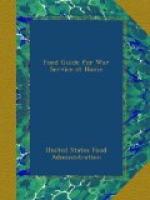The milk we have should be used as effectively as possible. The most economical way for a nation to use its milk so as to get the benefit of all the food in it, is, of course, as whole milk, or evaporated or dried whole milk. The next most economical way is in the form of whole-milk cheese, since all but the whey is used in it.
Cream and butter are much less economical unless all the skim milk is used. As 41 per cent of our milk-supply goes to make butter, we have large quantities of skim milk containing as much protein, it is estimated, as all the beef we eat.
At present we feed the largest part of this to animals or actually throw it away. Since the cottage-cheese drive of the Department of Agriculture, an increasing amount of it is being made into cottage-cheese—a palatable and useful meat substitute. It can, of course, be used as a beverage or in cooking. Whey also has many food uses. Buttermilk, too, is justly popular and healthful. Skim milk is not a substitute for whole milk for children.
Cream, valuable food though it is, is also extravagant in its use of milk. It takes five quarts of milk to produce a quart of cream. Buying whole milk is, therefore, better policy than buying cream and no milk. The sale of cream is now forbidden in Great Britain for this reason.
OUR MILK ABROAD
It is our supply of milk that is helping to meet the milk shortage abroad. Before the war we exported very little. By 1917 our export of evaporated, condensed, and dried milk had gone up twentyfold. In the spring of 1918 we sent over the equivalent in whole milk of almost 50,000,000 pounds a month, and should probably have sent much more were it not for the lack of ships. After the war, when ships are released, the demand for it will be enormous. It will take years to build up the dairy-herds of Europe again, so we shall continue to be their main source of supply.
LEARN AND TEACH THE UNIQUE VALUE AND ECONOMY OF MILK. DO EVERYTHING TO PREVENT IN THIS COUNTRY THE TRAGIC RESULTS WHICH ARE FOLLOWING THE CUTTING DOWN OF MILK CONSUMPTION ABROAD.
CHAPTER VIII
VEGETABLES AND FRUITS
Vegetables and fruits represent a different and happier phase of the food situation than our short supplies of wheat and meat. The vegetables especially are a great potential reserve of food, for they can be produced in quantity in three or four months on unused land by labor that otherwise might not be used.
Abroad every resource for vegetable-raising is being utilized to the utmost. France and Belgium have long made the most of all their land. Now England has made it compulsory to leave no ground uncultivated. Golf-courses are now potato-patches. Parks and every bit of back yard all grow their quota of vegetables. The boys in the old English public schools work with the hoe where before they played football.




